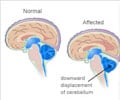Brain disorder in a baby can be detected by his or her eye movement, and a standard test is being developed for the same
Brain disorder in a baby can be detected by his or her eye movement, and a standard test is being developed for the same.
Professor Chris Harris, from the University of Plymouth, uses a computer- controlled chair with electrodes attached to the patient's head to see how "flicks" of the eye are affected by various medical conditions, reports the online edition of BBC News.The scientist said: 'The way we control our eye movements depends on brain function. Damage in various parts of the brain often leads to eye movement disorders. So by looking at abnormal eye movements, we can pick up on problems before they become too severe.'
He is currently working on a test that is expected to help develop new types of medication for clinical trials for several brain disorders.
There are a group of 1,500 often-terminal diseases that can be caused by chemical imbalances in the body, which ultimately cause brain cells to die.
Harris is particularly interested in diagnosing so-called neurometabolic diseases that affect skeletal muscle during sport, which are very difficult to diagnose.











